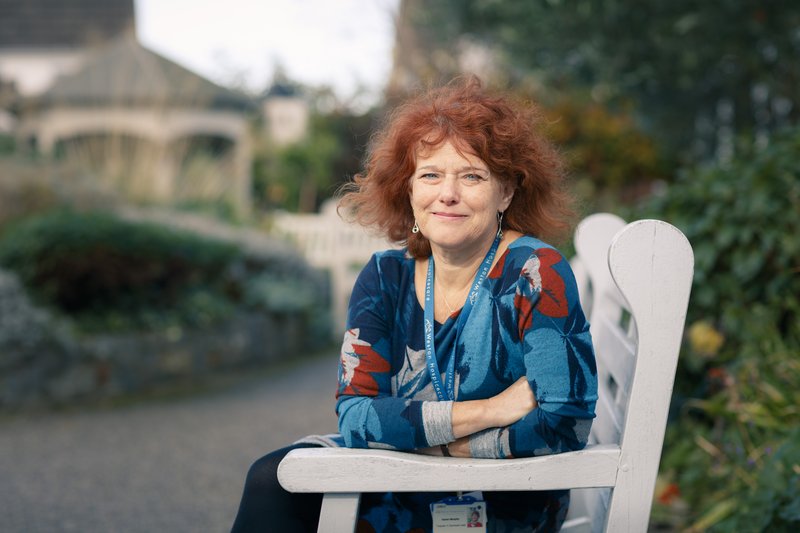Hospice chaplains: journeying with life and death
18 March 2021
18 March 2021
The Revd Karen Murphy, President of the Association of Hospice and Palliative Care Chaplains, considers her twenty years in hospice chaplaincy.
 “Chaplains are collectors of stories, confidences, confessions, hurts and joys,” says Margery Collin, an experienced hospice chaplain (from Chaplaincy in Hospice and Palliative Care, ed. Karen Murphy and Bob Whorton).
“Chaplains are collectors of stories, confidences, confessions, hurts and joys,” says Margery Collin, an experienced hospice chaplain (from Chaplaincy in Hospice and Palliative Care, ed. Karen Murphy and Bob Whorton).
This is an accurate description of a hospice chaplain’s work with patients and families living with a life-limiting illness. It is a unique and distinctive role within the multi-disciplinary team of the hospice healthcare setting.
Journey into chaplaincy
My journey into chaplaincy came through a church member who was on the board of a local hospice. I accepted an invitation to have a look around and was hooked. I became a volunteer chaplain and then worked part time before taking up my current post 13 years ago. No one has been more surprised than me that I continue to work with death and the dying day by day and feel totally content to be doing so.
I work at Weston Hospicecare, a small hospice serving patients in Somerset. The hospice has an in-patient unit for patients with complex symptoms, a day hospice facility and community-based care. The chaplaincy offers support to patients and their families in the hospice and at home.
I entered the healthcare world as a total ‘rookie’ and found medical jargon in the healthcare sector is as prevalent as church-speak in our churches. Initially it was like being in a foreign country. But now, after over 20 years of chaplaincy, I am in danger of joining the jargon speakers and really have to watch that I don’t add to the distress of patients in this unfamiliar world. Patients and families speak of being on a journey they don’t want to be on, and the language of MRI and CT scans, alongside other abbreviations can make them feel increasingly isolated.
Questions of life and death
So what does a chaplain do when daily conversations revolve around the mystery of life and death? I never pretend to have many answers, if any. Our spiritual care assessment asks the following: “Do you have a faith or belief that is important to you at the moment?” This allows people to say yes, no or anything in between.
 Most people will declare themselves to be non-religious, by which they generally mean that they do not attend a church or belong to a faith community. That’s my starting point and conversations spread out into many interesting directions. It’s been my privilege to accompany people who are re-connecting with faith, rejecting belief, or coming to faith for the first time.
Most people will declare themselves to be non-religious, by which they generally mean that they do not attend a church or belong to a faith community. That’s my starting point and conversations spread out into many interesting directions. It’s been my privilege to accompany people who are re-connecting with faith, rejecting belief, or coming to faith for the first time.
Not surprisingly, people suddenly find themselves asking the big questions about meaning, purpose and hope. The chaplain’s role is to be alongside, allowing the unspeakable to be spoken and to witness the patient’s journey of spiritual exploration.
The role also offers plenty of scope for initiating opportunities for patients and their families to come together for celebrations, rituals and conversations, which build memories and mend hurts. On many occasions I have had to respond quickly and effectively to an expression of spiritual need for which there is no prepared script. Weddings and marriage blessings have a poignancy that need careful wording; conversations around reconciliation are precious moments for families coming together after years of separation; patients ask for children to be baptized, blessed or named and funerals are conducted that are greatly influenced by patient input.
Passion and challenges
My passion for hospice chaplaincy has not waned after 20 years. Every day brings new challenges and these have had a profound impact on my personal spirituality. The many encounters I have had with people with and without faith have pushed and pulled my own beliefs in many directions. I am very grateful for this experience, which has enabled me to be grounded firmly in what I hold dear but sit lightly to other aspects of religious dogma and theological thinking.
The future of chaplaincy will be interesting as more people declare themselves ‘non- religious’. It is my belief that chaplaincy in its most creative, grounded and effective form is of immense value to anyone grappling with questions of meaning and purpose as life comes to a close. Hospice chaplains have to ask those questions of themselves and are then able to remain alongside patients, saying little but representing compassion and hope.
Association of Hospice and Palliative Care Chaplains
The Methodist Church offers ‘death and dying’ web resources and links to other online material that respond to the needs of those requiring palliative care.
This article originally appeared in the connexion magazine, issue 13.
Photos: © Mark Kensett, TMCP
The Methodist Church is not responsible for any third party content linked to from this website.